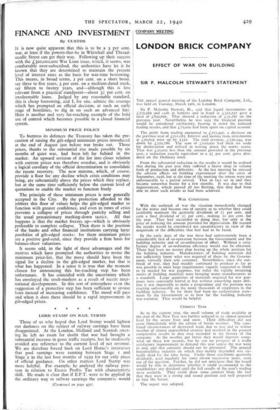COMPANY MEETING
LONDON BRICK COMPANY
EFFECT OF WAR ON BUILDING SIR P. MALCOLM STEWART'S STATEMENT
THE annual general meeting of the London Brick Company, Ltd., was held on Tuesday, March 19th, in London.
Sir P. Malcolm Stewart, Bt., said that liquid investments at £370,389 and cash at bankers and in hand at £522,237 gave a total of £892,626. That showed a reduction of £33,281 on the previous year. Nevertheless he was sure the financial position would be considered satisfactory, bearing in mind the reduced trading results, and that £70,000 had been spent on capital account.
The profit from trading amounted to £315,492, a decrease on the previous year of £251,083. Interest and income from investments at £20,659 were up by £322. The total revenue, £336,344, was down by £250,786. The sum of LI oo,000 had been set aside for depreciation and utilised in writing down the works assets. That was £5o,000 less than the amount provided in the previous year, a reduction exactly equivalent to a 2f per cent. gross divi- dend on the Ordinary stock.
From the substantial reduction in the results it would be realised that during the past year they suffered a heavy drop in volume both of production and deliveries. At the last meeting he stressed the adverse effects on building experienced after the crisis of September, 1938, but at the time of the meeting the omens were not unfavourable to a partial revival. That in fact set in and they became somewhat busier for a few months. It was due to that improvement, which proved all too fleeting, that they had been able to show such results as had been achieved.
WAR CONDITIONS
With the outbreak of war the situation immediately changed for the worse and became one of anxiety as to whether they could justifiably maintain the quarterly dividends of 21 per cent, and earn a final dividend of 21 per cent., making to per cent. for the year. They had succeeded in doing that, but only at the price of reducing the amount provided for depreciation. He trusted the results would be considered not unsatisfactory in view of the magnitude of the difficulties that had had to be faced.
In the early days of the war there had unfortunately been a considerable lack of co-operation between the Government and the building industry and of co-ordination of effort. Without a satis- factory degree of co-ordination efficiency would not be obtained. There had been no master plan keying up the whole position for the building industry. Manufacturers of building materials did not sufficiently know what was required of them by the Govern- ment, virtually their sole customer. Nevertheless, since the out- break of war, they had steadily continued to produce as far as was possible to meet large requirements vaguely suggested as likely to be needed for war purposes, but today the rapidly mounting stocks of building materials were bringing many manufacturers to a standstill. Large quantities of materials required for war pur- poses were constantly hinted at but without something more defi- nite it was impossible to make a programme and the position was reacting unfavourably on the many thousands of employees in the building industry. So far there had been no authoritative state- ment by the Government as to how far the building industry was essential. That would be helpful.
CURRENT YEAR
As to the current year, the small volume of trade available at the start of the New Year was further reduced to an almost nominal level by the severe frost and snow. Their difficulties did not cease immediately with the advent of better weather. The com- bined circumstances of decreased trade due to war and to winter weather of almost unparalleled severity had resulted in the poorest comparative results to date ever recorded in the history of the company. As the weather got better they would improve some- what on those low records, but he saw no prospect of a really satisfactory improvement in demand this year unless the war were to end, and that certainly should not be presumed. The general housebuilding industry on which they mainly depended was vir- tually dead for the time being. Under those conditions quarterly dividends, paid regularly for some eleven successive years, were out of the question. Further, he did not anticipate that the board would be able to determine whether it could recommend to the stockholders any dividend until the full results of the year's trading were available. They could draw some comfort from the fact that they were in a strong and sound position and well prepared to face the future.
The report was adopted.






































 Previous page
Previous page